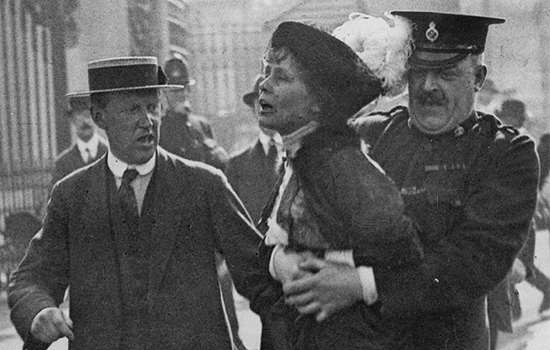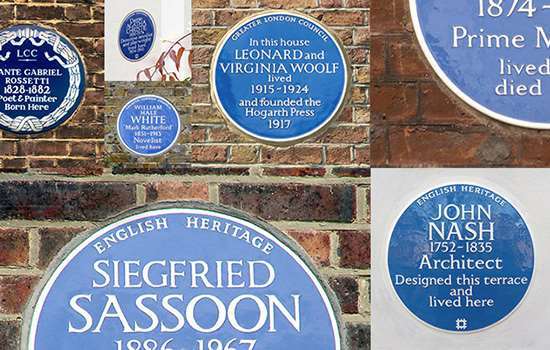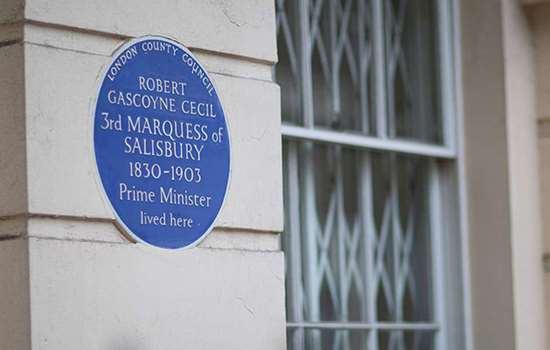PANKHURST, Emmeline (1858-1928) & PANKHURST, Dame Christabel (1880-1958)
Plaque erected in 2006 by English Heritage at 50 Clarendon Road, Notting Hill, London, W11 3AD, Royal Borough of Kensington and Chelsea
All images © English Heritage
Profession
Suffragette leaders
Category
Philanthropy and Reform, Politics and Administration
Inscription
EMMELINE PANKHURST 1858-1928 Dame CHRISTABEL PANKHURST 1880-1958 Campaigners for Women's Suffrage lived here
Material
Ceramic
Emmeline Pankhurst and her daughter Christabel led the militant campaign for women’s right to vote in the early 20th century. During the First World War, they both lived at 50 Clarendon Road in Holland Park, where Emmeline also cared for her adopted ‘war babies’.
THE PANKHURST FAMILY
Emmeline Goulden was born in Manchester in 1858 and attended her first women’s suffrage meeting with her mother at the age of 14. In 1879 she married Richard Pankhurst, a Manchester barrister and radical who authored the first women’s suffrage bill in Britain. Emmeline and Richard worked tirelessly for the cause and their homes in Manchester and London became regular meeting points for fellow social reformers.
The Pankhursts had five children, and the two eldest, Christabel and Sylvia, were to follow in their mother's footsteps and become leading figures in the women’s suffrage movement.
‘DEEDS NOT WORDS’
Emmeline and Christabel founded the Women’s Social and Political Union (WSPU) in Manchester in 1903. The WSPU was far more militant than the National Union of Women’s Suffrage Societies, led by Millicent Garrett Fawcett, and its members became known as the ‘suffragettes’. WSPU members employed increasingly strong tactics, including civil disobedience, in the years before the First World War, as successive governments failed to reform voting laws. ‘Deeds not words’ was their motto.
After obtaining a law degree in 1906, Christabel moved to the WSPU headquarters, now in London, and became its organising secretary. In the meantime Emmeline had adopted sensational new propaganda methods including processions to the House of Commons, speeches and rallies.
In 1913, these activities – which had included smashing the Prime Minister’s windows – culminated in Emmeline being sentenced to three years’ imprisonment. She refused to eat, sleep or drink and was consequently released, only to be re-arrested again and again, serving 30 days in all. These hardships took their toll and Emmeline was never again so actively militant, but the harsh manner in which she and other imprisoned suffragettes were treated contributed to a growing public sympathy for their cause.
BEHIND THE SCENES
Where Emmeline was notable for her militancy, Christabel was known for her remarkable abilities as an organiser and was the force behind many of the WSPU’s plots and ruses. So valuable was this work that she had to avoid taking part in militant demonstrations for fear of imprisonment. She did, however, become widely known as a powerful orator and writer. In 1912, following a raid on the WSPU headquarters, she escaped to Paris to continue her work for the cause.
‘WAR BABIES’
The outbreak of the First World War in 1914 led to a political truce in the suffrage movement and an end to the period of militancy. Emmeline turned her skills to supporting the war effort and in 1915 she adopted four ‘war babies’, children born out of wedlock as a result of the social upheaval.
In 1916 she rented and furnished a new home at 50 Clarendon Road, Holland Park, where she lived with the children, one of whom Christabel later adopted. In 1917, Emmeline opened a nursery and adoption home for female orphans in Aubrey Road, close by. Number 50 – a mid-19th-century semi-detached house – was her home from 1916 until autumn 1919, when she left for Canada. Christabel stayed here with her mother for periods between 1917 and 1919.
VICTORY
A limited number of women were granted the right to vote in 1918. Returning to England in 1926, Emmeline was hailed as a leader of the women's rights movement and was selected as a prospective Conservative candidate for Whitechapel and St George’s, Stepney. She died before she could face the electorate, on 14 June 1928. Just a few weeks later on 2 July a second Representation of the People Act became law, giving all women over the age of 21 the vote.
Christabel moved permanently in the United States during the Second World War, dying in Los Angeles in 1958.


